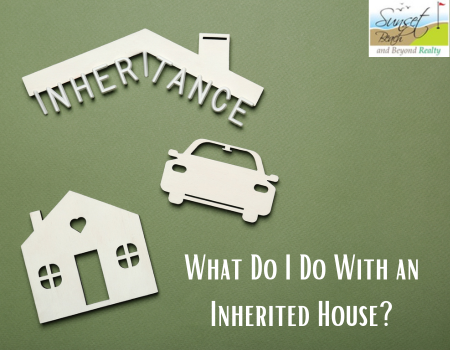Inheriting a house can be both a bittersweet and confusing experience to walk through. The tangible reminder of the passing of a loved one also comes with some significant burdens and decisions especially when an inherited house is in the mix.
What to Do With an Inherited House and How to Handle the Process
Immediate Steps
 Understand the Legal Process surrounding an inherited house: Do you know if the property is part of a probate process? This legal process involves validating a will and distributing the deceased person’s holdings and valuables.
Understand the Legal Process surrounding an inherited house: Do you know if the property is part of a probate process? This legal process involves validating a will and distributing the deceased person’s holdings and valuables.- Assess the Property: A complete and thorough inspection of the property will need to be done, so you know its condition. The structural integrity and any potential repairs will need to be detailed.
- Appraise Financial Implications: Determining the property’s value and any existing debts will be important. Look at things like mortgages or unpaid taxes. Also, consider insurance and maintenance expenses.
- Weigh Your Options: What are the pros and cons of different paths? Living in the house, selling it, renting it out, or holding onto it as an investment.
Key Decisions
- Living in the House: If you plan to live in the home, will it fit your lifestyle? Consider the location, size, condition, and potential renovation costs of the house you’ve inherited.
- Selling: If selling is the decision you’ve come to, explore different options before you. You could go the conventional route by selling with a real estate agent. This is generally a bit time-consuming but will generally give you a higher profit. A quick sale to an investor may be more streamlined, but you will probably be leaving some money on the table.
- Renting Out the Property: If the property seems like a good rental situation, perhaps you will want to use it to generate income. You will want to be sure to research rental market conditions and landlord responsibilities. This might be more hassle than it’s worth if your current life does not have the margin to become a landlord.
- Holding as an Investment: If you think the property’s value will go up, holding it as an investment might be a good plan. This does come with potential expenses and liabilities, as you can’t predict the market and a house that is sitting will generally cost you money over the long run.
Financial Considerations
- Probate Costs: Be sure that you understand the costs connected with probate, which includes attorney and court fees and executor’s commissions, there is a lot of costs that are often associated with inherited houses.
- Taxes: Can you avoid paying capital gains taxes? Find a tax professional who can help you understand what you will be held to.
- Mortgage and Debt: Does the property have a mortgage or other debts? You will want to have a good game plan for handling these financial responsibilities.
- Maintenance and Repairs: Whether you decide to live in the house, rent it out, or sell it, budgeting for repairs and maintenance costs will have to be on your radar regarding your inherited house.
Emotional and Family Dynamics
- Shared Ownership: If you have inherited the house with siblings or other heirs, open communication is going tobe critical. Families have fallen apart in situations like this. Discuss your plans and expectations to avoid unnecessary conflicts.
- Sentimental Value: Does anyone in the process have a great emotional attachment to the property? If so, tread lightly as you are making decisions, understanding this will influence the process and allow yourself plenty of time to work through the options.
Additional Tips
- Seek Professional Advice: Don’t try to go it alone. Consult with a financial advisor and attorney to guide you through the process of handling an inherited house. A real estate agent will be invaluable in the process as well.
- Create a Realistic Timeline: As you walk through grief, it’s important to set realistic goals and timelines for each step. The feeling of being overwhelmed on top of grief will not help you make sound decisions.
- Consider Short-Term Rentals: If you’re unsure about your long-term plans, making the inherited house a short-term rental can be a good temporary solution. Consider working with a property management company to not take onmore responsibility than you care to.
- Explore Government Programs: Research government programs or incentives that might apply to your situation, such as property tax exemptions or homeownership assistance regarding an inherited house.
We would truly love to walk beside you during this difficult season and lift the burden a little. Contact us today to talk through your situation regarding an inherited house or any other real estate needs.
